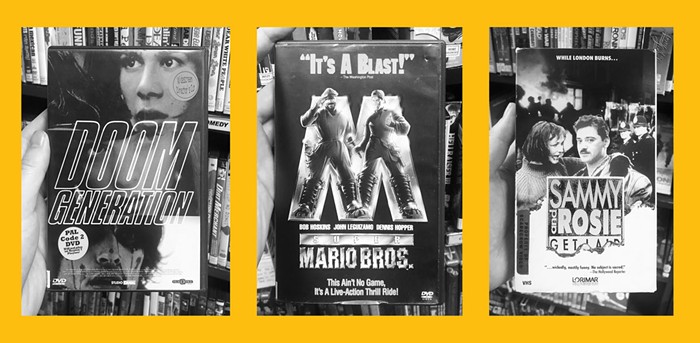Congrats, you're surviving the "streaming wars." We are living through a time when there are hundreds of streaming services to choose from in the United States. Disney+, Peacock, and HBO Max are the big, flashy new ones, but nearly any niche interest can be satisfied through a streaming option. Do you like kung fu? Try HI-YAH! Obsessed with British TV? You've got two services just for that: Acorn TV and BritBox.
But the great fraud of our streaming age is the illusion of infinite content. We've done away with physical media because we've become convinced that the internet, with its hundreds of streaming services, contains everything. But anyone who has been to Seattle's Scarecrow Video knows that this isn't true.
Scarecrow, the largest video library in the world, is a national treasure right in our backyard. Its library currently has around 132,000 titles for rent. Netflix, according to a recent count from the Wall Street Journal, has around 7,000 titles available online. Amazon's Prime Video, while roughly nine times larger than Netflix, still only offers half of what you find in Scarecrow's library. (Most of Amazon's library is also user uploaded, making it more like YouTube than a traditional streaming service.) Scarecrow estimates that to substitute its offerings with streaming services, you'd need 10 different services, it would cost $100 per month, and you'd still get only one-third of their whole catalog.
Let's dip into three rare titles that are totally unstreamable—meaning you can't stream, rent, or buy them on major streaming platforms—but are available for rent at Scarecrow.
SUPER MARIO BROS. (1993)
The concept of a "guilty pleasure" is stupid—if you like something, you like something. But if I had to have a guilty pleasure, it would be Super Mario Bros. The early '90s live-action adaptation of the popular video game franchise follows John Leguizamo as Luigi and Bob Hoskins as Mario as they plumb their way to saving the world. Cool guy Dennis Hopper plays the main villain. Everything is very stylized and weird.
I'm pretty sure this movie is an early gay root for me. In this Super Mario Bros., Mario is Luigi's daddy. Mario likes muscle-women who can slap him around. Luigi is both trade and a twink. Fiona Shaw is in the movie, too, and sports a witchy sensuality. My eyes were WIDE when I was watching this as a kid. Don't get me started on the dinosaurs.
THE DOOM GENERATION (1995)
Sarcastically taglined as "A Heterosexual Film by Gregg Araki," The Doom Generation is a steamy, misunderstood bisexual piece of trash. In The Scarecrow Video Movie Guide, Matt Lynch argues that "this film should be wiped from existence—the negative burned, all tapes and DVDs destroyed, and any memory, good or ill, of this piece of shit exiled into the void for all eternity." A sizzling take I disagree with but love.
Thankfully, Scarecrow didn't take his recommendation. The film's plot is like that of Sartre's No Exit, but with hot bi boys with pouty lips who bone a volatile early-career Rose McGowan—and each other. All together! It opened a few months after Clueless, and it's helpful to think of this ennui-filled mess as a foil to that pop sensation. While most filmmakers aim to create films that are the pinnacle of their genre, Araki is comfortable exploring a genre's very bottom, its nadir. And we all know bottoms need exploration, too.
SAMMY AND ROSIE GET LAID (1987)
I love director Stephen Frears (Dangerous Liaisons, Florence Foster Jenkins, Philomena), but I especially love his earlier work with screenwriter Hanif Kureishi. The pair made two extraordinary movies: first, My Beautiful Laundrette in 1985, which features Daniel Day-Lewis playing a character in an interracial gay relationship, and then Sammy and Rosie Get Laid in 1987, a film featuring freaky straights in a burning London. My Beautiful Laundrette is lauded, but Sammy and Rosie Get Laid is nearly lost, which is upsetting.
I could write 1,500 words on this film, but I don't have much space so I'll stick with one point. When the film's main character, Sammy, a Pakistani, is told by his father to leave England and return home, he delivers an iconic line: "We love our city and belong to it. Neither of us are English; we're Londoners, you see." It's a love letter to London, a reminder that some of us pledge allegiance to city before country.
But the film's London is so different from Seattle. The sexiest character in Sammy and Rosie happens to live in a homeless encampment (one that gets swept up, too). Even though he's without a home, he's still portrayed as sexy, radical, progressive, even aristocratic. His financial condition isn't a personal failure. It isn't the fault of London, either. Rather, those who rule the city are responsible. Sammy's London is a long way away from Mayor Durkan's Seattle.
For more than a hundred more unstreamable recommendations, check out thestranger.com/unstreamable.














